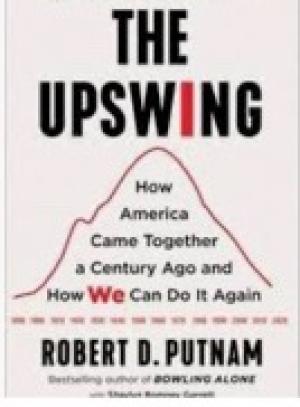
The New Hampshire Institute of Politics welcomed authors Dr. Robert D. Putnam and Shaylyn Romeny Garrett on March 28, 2022, to discuss their book “The Upswing: How America Came Together a Century Ago and How We Can Do It Again.”
Dr. Putnam’s opening remarks reflected the way America is as a society. He stated, “America is extremely polarized. It is as unequal as we have ever been in our national history. We have been self-centered as we have ever been.” This opening statement reflected the ideas presented in his and Shaylyn Romeny Garrett’s book. America had an upswing in polarization, economic equality, social cohesion, and cultural solidarity. In recent years, America has seen a downwards trend from the former upspring. The question these authors answer in their book is “how did we get here?”
Dr. Putnam presented a chart that compares political comity from the 1880’s to 2020. He explains that in the 1900’s, American politics was very polarized. The graph shows an increase in the 1950’s and 1960’s where people cooperated with politics. The graph then shows a downward trend starting in the 1970’s that ends in the present day. America is now presently in the worst era of polarization. Dr. Putnam compared the role of politics throughout society. He stated, “Politics can seem very different to you depending on when you come into the story.” He described this to explain that polarization is at its worst because the role of politics has a very different meaning to each generation.
The next graph Dr. Putnam presented showed economic equality between 1913 and 2015. During the 1920’s, the gap between the rich and the poor grew smaller. Both economic classes were doing well and were able to be equalized. This rose until the 1960’s, and changes occured around the 1980’s. During this time, the economic equality gap is bigger than ever. Dr Putnam used the COVID-19 pandemic as a reason for this gap. This is because of unemployment, the closing of businesses, and inflation.
Social cohesion is also another argument presented in their book. After the 1950’s Americans knew their neighbors. Almost two thirds of Americans agreed that they trusted people in society. In comparison to today, only one quarter of Americans agree that they trust people. Dr. Putnam commented, “We are not connecting with people. We do not know our neighbors. Less and less people are getting married.” The downward trend of social cohesion is prevalent in our society.
Shaylyn Romney Garrett spoke about cultural solidarity and the difference between “we and I.” In an “I” society, the term “I” is used more frequently than “we”. Shaylyn stated that “We are way more self-centered nowadays than ever before.” Shaylyn presents the “I, we, I, curve” and explains the lessons we can learn from America’s last upswing. Shaylyn gave the advice, “We need to have moral conversations about our values to have an upswing today.” Dr. Putnam also added, “It does not need to be religious, it has to be about values.” The two authors encouraged young people in our society to be the change. They hope that all young people can encourage the shift in the upswing of this generation.
Finally, the authors were open to questions from the audience. The first question asked, “How could the current crisis in Ukraine affect the upswing?” Dr. Putnam enjoyed this question. He responded, “We are not going to solve the problem of Ukraine if we are just thinking about ourselves. If the world doesn’t stick together, that problem won’t resolve.” Another major question that was asked, “What role did the experience of adversity and sacrifice play in the first upswing?” Garrett answered this question with ease, “Upswing started before World War II, not a crisis, it's a choice. It is a huge lesson for citizens to respond to the moment we are in.”
The event concluded with the audience in applause for the two authors. Dr. Robert D. Putnam and Shaylyn Romney Garrett were delighted to receive positive feedback in the Institute.
